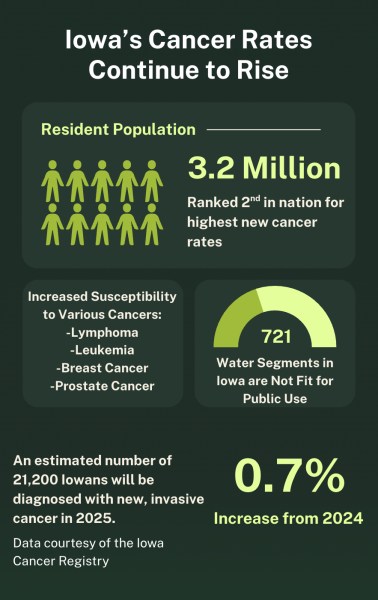As cancer rates continuously rise, more and more Iowans are seeking accountability from pesticide companies for their role in the upward trend. Iowa’s legislation, however, is attempting to protect the companies rather than the people.
In 2025, Iowa was named the state with the second-highest new cancer rates. Cancer types affecting Iowans the most include lung, breast, colon and melanoma. These rates continue to rise despite Iowa’s lack of a high smoking rate or external factors.
This points to one environmental factor: pesticides.

Iowans frequently use pesticides to increase crop yield. Prolonged pesticide exposure, however, can lead to increased susceptibility to lymphoma, leukemia, breast and prostate cancer.
One important measure that can be taken, though, is towards health education and awareness for Iowans. “Many people in Iowa are unaware of harmful substances found in crops. Education can help prevent the illnesses found by pesticides. Being a farm state, many Iowans are exposed to crops with pesticide. A lot of these chemicals can cause health problems and simply educating Iowans can go a long way,” said junior and Future Physicians of America president Harjeevan Singh.
Yet, the Iowan government is endorsing support for companies that go against this very measure.
Senate Bill 1051 recently advanced from the Iowa Senate. This bill protects pesticide companies even if they fail to warn consumers about claims.
This essentially leaves pesticide companies under the protection of federal law if they choose not to warn consumers about cancer, one of the leading side effects of the chemicals. “Big corporations need to be held accountable and Iowans should have warnings about the dangers of pesticides and their side effects- not only on human health but also the health of the environment,” said junior and Environmental Club vice president Amelia Morgart.
Agricultural states like Iowa already suffer from pesticide pollution in water bodies and in the natural ecosystem due to the heavy use of chemicals. These pollutants seep into water systems used for consumption and recreational use. At least 721 water body segments in Iowa do not meet standards for recreation, public water supplies and the protection of aquatic life.
As pesticide usage continually damages the environment, it harms humans in conjunction. “It is the duty of our government to protect the land and people that they serve, this bill’s passage would have direct negative effects on both. Our environment is already suffering from pesticide use and now we are starting to see effects on the health of Iowans,” added Morgart.
Therefore, the implementation of Senate Bill 1051 establishes that cancer-causing pesticides can go unnoticed by the state legislature despite their association with the rising cancer rates throughout Iowa.
Iowa legislatures should take the measures necessary to protect its people from pesticides. While Iowa is heavily agricultural, high cancer rates are sweeping the state and must be accounted for; regulating pesticide use is a step in the right direction.









